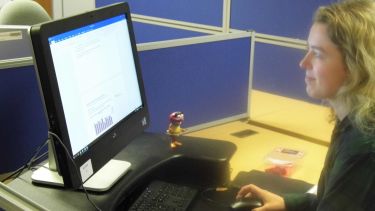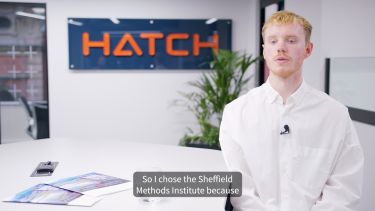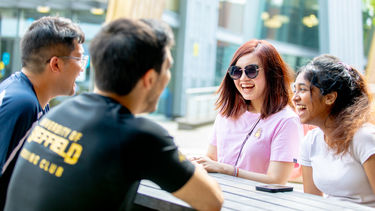Olivia @ WPREU
Olivia enjoyed her 2017 internship at WRPEU so much that she returned in 2018 for another one. Here she describes both experiences.

2017 blog | 2018 blog
2017
During my studies, both through the SMI department and the Politics department, I have undertaken various data analysis research projects. I have found working with both quantitative and qualitative data extremely interesting and I hope to further my experience working with data next year with my Dissertation in Political Analysis. This summer I was able to work on a research project for the Widening Participation Research and Evaluation Unit (WPREU) at the University of Sheffield, analysing student attainment data and furthering the work done previously in the department on the Ethnicity Attainment Gap within the University.
One aspect of the placement that I found particularly interesting was that the project was building on previous research. After reading the other reports, I could then decide which areas of research I wanted to focus on and analyse in more detail. Having the freedom to choose the focus of my research was initially challenging, as the dataset was large and difficult to get to grips with. However, it made the placement more interesting, as the other SMI placement students and I could focus on what interested us the most.
The first few weeks of the six-week placement were challenging for a few reasons. Not only was it by far the largest dataset I had ever worked with, 16077 cases and dozens of variables, but I had only used the software (IBM SPSS) once before. Learning to use SPSS again was difficult, but we received plenty of help on how to use the software and also how to write syntax for it.
I learnt how to be selective with the data I chose to present and only include the data visualisations that directly explained the key findings of the report"
Olivia
WPREU intern
I also learnt a lot about how to present data. This is a topic I have studied previously but having to put it in to practice in a real research project was interesting. Our first draft of the research report was over 200 pages long and the process of concentrating all the information in to a 30-page report was hard. I learnt how to be selective with the data I chose to present and only include the data visualisations that directly explained the key findings of the report. We also had to present the data in a presentation on the last day of the placement. This involved summarising the findings of the report and explaining the most interesting analysis. We also outlined the next steps for the research with the dataset and the different analysis that should be explored, including regression and qualitative research to complement the existing quantitative data.
Overall, the WPREU placement was challenging but very interesting. I have developed my SPSS skills and learnt how to use syntax. It was eye-opening to work on a real data analysis project and see how important research is for making changes to the University.
2018
This summer I worked on two research projects for the WPREU team at the University of Sheffield. I worked for them last year, working on the ‘Further Exploration of the Attainment Gaps at the University of Sheffield’ report. I was therefore already used to the office environment and the team at WPREU. I enjoyed returning for another summer placement.
I wanted to expand my experience of research projects by undertaking both qualitative and quantitative research projects. I am working on a qualitative project on the experiences of mature students, which will involve a series of interviews in the last few weeks of my placement. I have never undertaken this type of research before so I am excited to gain some new experience. I am currently waiting for the ethics application approval to move forward with this project.
I am also working on a quantitative project, looking at the attainment data for medicine and dentistry students. I have not looked at their attainment before, so I have to get used to different attainment data and marking systems. However, since I have completed my final year of my degree, I can utilise my extended knowledge of data analysis and the different techniques and methods for SPSS that I learnt whilst completing my dissertation. Furthermore, their attainment patterns are very different to the rest of the institution so I have had to do more academic research to understand the existing literature on the study of medical and dental student attainment. I am looking forward to completing my two projects and presenting them at the WPREU SMI project presentations in September.
The placement is providing me with some useful insights into the world of work. I have had the freedom to design the projects that I want to work on and decide which methods I will use.
For one of my projects, I decided to use face-to-face interviews to collect information. I am excited to collect my own qualitative data, as this is not something that I have done before. Although I don’t have experience collecting qualitative data for analysis projects, I have conducted interviews before so I think I will have the skills to use the interviews to get the information required for the research. I will also combine the knowledge I gained from studying at SMI, to avoid causing interviewer bias or asking leading questions.
For my other project, I have learnt to think more about the narrative I am telling with my data analysis, and how my visualisations affect the engagement of the audience. I find crosstabulations personally useful as they contain large amounts of information in a compact amount of space and the data is clearly signposted by columns and rows. However, I have learnt that, in order for my analysis to impact and resonate with the stakeholders in the university that will receive my reports, I must employ different methods of visualisation so that the audience clearly understands the narrative of the report.
It has been great to see my research projects so well-received by stakeholders in the university"
Olivia
WPREU intern
I wanted to give the reader all the information by giving them a full histogram of the attainment, but I also wanted to give a general overview, so I used the Normal line. By offering further information of the mean, standard deviation and number of cases, I allowed the reader to decide how much information they wanted to take from the visualisation of the data.
During my final weeks, I did my presentation for the reports I completed during my placement. The report I talked about was the quantitative reports studying student attainment, using data from the Medicine and Dentistry departments.
As I have already done a presentation for my placement at WPREU last year and repeated this presentation for the university-wide WPREU forum in May, I was more confident for this presentation. I and three other interns presented, to an audience of around thirty stakeholders in the university. Among them were attendees from the staff at the medical and dentistry departments, so my presentation was of particular interest to them.
I designed my presentation to be a brief summary of my analysis and final report. I wanted to give people an overview of my work, and report the key findings without making the presentation too long. I knew if it was too long or included too much jargon or figures that I may not hold people’s attention. The presentation went well, I felt I presented my research concisely and it was received well. It sparked an interesting debate among the audience members about the importance of analysis of attainment in separate departments within the university.
There was also a lot of support for analysing the medical and dentistry departments separately from the rest of the institution because there is a very different social and academic culture within these departments. It seems that there will be a demand for similar research in the next few years to assess the situation. I have found this placement really interesting, and it has been great to see my research projects so well-received by stakeholders in the university.

Mae & Charlie are here to tell you more about Applied Social Sciences
Applied Social Sciences student Mae and alumnus Charlie will tell you what they enjoy most about the course, what skills they have learned and how it has helped develop their career.

International Merit Scholarships
We offer a generous package of financial support for international students including 75 undergraduate scholarships worth £10,000 towards the annual tuition fee and 125 postgraduate taught scholarships worth £5,000 towards the tuition fee. Applications are now open for existing offer holders.
